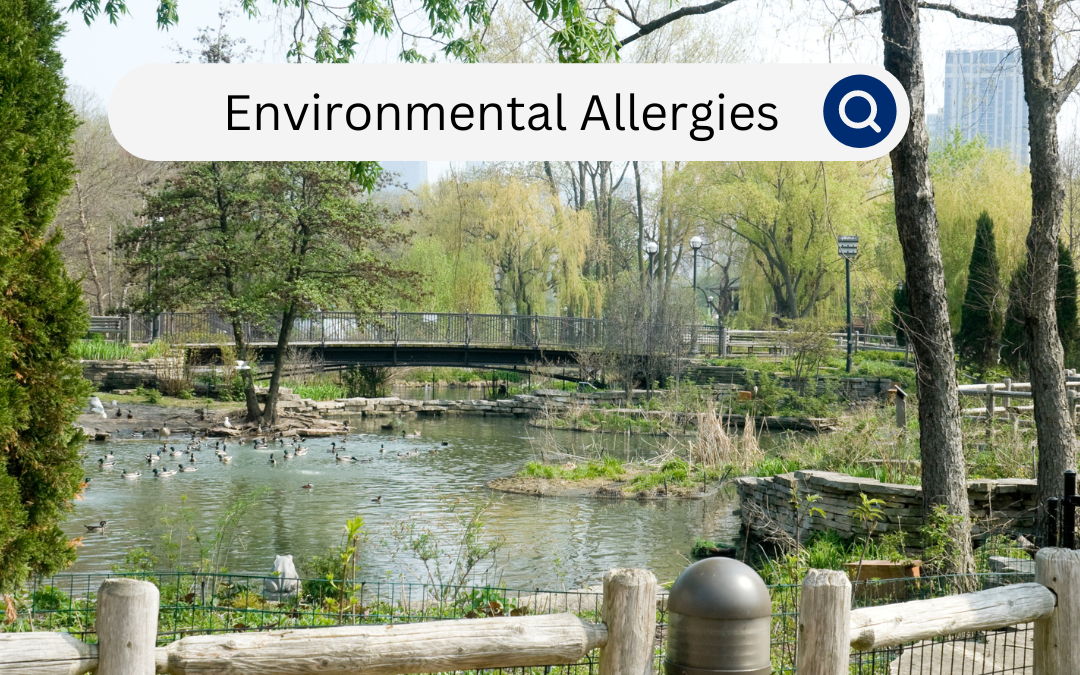Environmental allergies are an increasingly common ailment that affects millions of people worldwide. Unlike food allergies, which are often recognized early in life, environmental allergies can develop at any age and are triggered by substances in our surroundings. These allergies can range from mild irritants to severe hindrances that affect daily life and overall health. Here’s a detailed look at what causes these reactions, the typical symptoms they produce, and the best ways to manage them.
What Are Environmental Allergies?
Environmental allergies, also known as allergic rhinitis or hay fever, occur when the immune system mistakenly identifies a harmless outdoor or indoor substance as a threat. This triggers an immune response, releasing chemicals like histamine into the body. This immune system overreaction can cause symptoms that range from annoying to debilitating.
Common Environmental Allergens
Environmental allergens can be broadly categorized into outdoor and indoor allergens:
Outdoor Allergens:
1. Pollen: This is one of the most common triggers of seasonal allergies. Trees, grasses, and weeds release these tiny particles into the air to fertilize other plants.
2. Mold Spores: Molds release spores that can be carried by the wind. They thrive in wet environments and can be found both outdoors and indoors.
Indoor Allergens:
1. Dust Mites: These tiny creatures live in household dust. They feed on dead skin cells and thrive in warm, humid environments.
2. Pet Dander: Flakes of skin shed by cats, dogs, and other furry or feathered animals can trigger allergic reactions.
3. Cockroach Droppings: Proteins in the droppings of cockroaches can also trigger allergy symptoms.
Symptoms of Environmental Allergies
The symptoms of environmental allergies can affect the respiratory system, skin, and eyes. Common symptoms include:
• Nasal congestion: A blocked or stuffy nose caused by inflamed blood vessels in the sinuses.
• Runny nose: Frequent discharge of fluid from the nasal cavity.
• Itchy, watery eyes: Also known as allergic conjunctivitis, where the eyes redden, itch, and water excessively.
• Sneezing: Sudden, forceful expulsion of air through the nose and mouth.
• Itchy throat or cough: Irritation in the throat due to postnasal drip where mucus runs down the back of the throat.
• Fatigue: Many people with allergies also experience general tiredness, which may be due to poor quality sleep from symptoms or the body’s immune response.
Diagnosis of Environmental Allergies
Diagnosing environmental allergies typically involves reviewing the patient’s medical history and symptoms and conducting tests. The most common tests include:
• Skin prick tests (SPT): Small amounts of potential allergens are pricked into the skin to see if there’s an allergic reaction, such as swelling or redness. Skin tests are the gold standard.
• Specific IgE blood tests: This test measures the level of IgE antibodies to specific allergens in your blood, indicating your sensitivity to various substances. Blood testing is secondary in accuracy.
Treatment and Management
Managing environmental allergies primarily involves avoiding triggers, medications to ease symptoms, and sometimes immunotherapy.
Avoidance
Avoiding allergens is a critical first step in managing environmental allergies:
• Stay indoors on dry, windy days when pollen counts are high.
• Use air purifiers to reduce indoor allergens like dust mites and pet dander.
• Keep humidity low to prevent the growth of mold and dust mites.
• Clean surfaces regularly to reduce dust and pet dander.
When to Seek Treatment
While over-the-counter remedies can provide relief for many allergy symptoms, there are specific scenarios where professional medical treatment becomes essential. Here’s what you should know about when it’s time to see an allergy provider about your environmental allergies.
Persistent or Worsening Symptoms
If you’ve been using over-the-counter allergy medications like antihistamines or nasal corticosteroids and your symptoms persist or worsen, it may be time to consult a healthcare provider. Persistent symptoms can indicate that your current treatment isn’t effective, and you might need a different approach or a prescription-strength medication to manage /your allergies properly.
Impaired Daily Functioning
When allergies begin to interfere significantly with your daily life—such as affecting your sleep, work, or personal activities—it’s a clear signal to seek medical advice. Allergies can cause not only physical discomfort but also impair your ability to concentrate, perform tasks, or enjoy leisure activities.
Frequent Sinus Infections or Ear Infections
People with environmental allergies are at a higher risk of developing sinus infections and ear infections due to ongoing nasal and sinus congestion. If you notice that you’re experiencing frequent infections, a healthcare provider can help manage your allergies more effectively and prescribe treatments that can prevent recurrent infections.
Asthma or Breathing Issues
Allergies can exacerbate asthma symptoms or even lead to difficulty breathing, which definitely warrants medical attention. If you have asthma and notice an increase in wheezing, shortness of breath, or other respiratory symptoms during allergy season, it’s important to see your allergy provider. Managing both your asthma and allergies is crucial to maintaining your overall respiratory health.
Over-the-Counter Medication Isn’t Enough
If you find that over-the-counter treatments are not relieving your symptoms, or if you are experiencing side effects from these medications, professional medical advice can help. Healthcare providers can offer prescription alternatives that might be more effective or better suited to your particular needs.
Severe Allergic Reactions
Though rare, severe allergic reactions (anaphylaxis) to environmental allergens do occur. Signs of a severe allergic reaction include difficulty breathing, swelling of the throat or face, rapid heartbeat, dizziness, or a sudden feeling of extreme weakness. This is a medical emergency, and immediate treatment is critical.
Consider Allergy Shots
If you’re interested in long-term treatment options that can potentially desensitize you to allergens, discuss allergy shots (immunotherapy) with an allergist. This treatment involves regular injections of a small amount of the allergen, with the aim to gradually build up your immune system’s tolerance. An allergist can determine if this treatment is suitable for you based on your allergy type and severity.
• Allergy shots (subcutaneous immunotherapy): Regular injections of allergens over several years to build tolerance.
• Sublingual immunotherapy (SLIT): Allergen tablets or drops placed under the tongue, an alternative to shots.
Medications
Various over-the-counter and prescription medications can help control symptoms:
• Antihistamines: Reduce sneezing, sniffling, and itching by blocking histamine.
• Decongestants: Relieve nasal congestion but should be used for only a few days at a time.
• Nasal corticosteroids: These sprays treat inflammation directly in your nose and are often the most effective medication for allergic rhinitis.
• Leukotriene modifiers: Block the action of certain immune system chemicals.
Living With Environmental Allergies
While environmental allergies can be disruptive, they are also manageable with the right strategies. Regular consultations with an allergy specialist can provide you with personalized advice and treatment updates, ensuring that you lead a more comfortable, symptom-free life. Furthermore, being proactive about managing your environment and understanding the conditions that exacerbate your symptoms can make a significant difference in your quality of life.
In conclusion, environmental allergies require a comprehensive management strategy that includes medical treatment, lifestyle adjustments, and possibly long-term desensitization. By understanding your triggers, taking appropriate preventive measures, and using available treatments effectively, you can significantly reduce the impact of allergies on your daily life.





